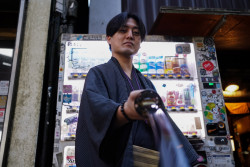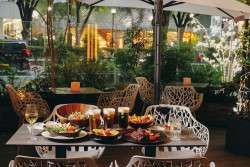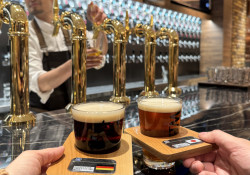
Originally published on metropolis.co.jp on April 2011
MAKIN’ A BUCK
- Police in Tokyo arrested two people for selling a drug called premium zeolite that they claimed “was effective for detoxification, including dealing with contamination from radioactive substances.” Apparently, the pair did not have proper licenses and those claims were unproven.
- One good thing to come out of the quake: Japan Tobacco’s distribution bases were damaged, resulting in a “nationwide shortage of cigarettes” with only about 25 percent of the supply available compared to pre-quake levels.
- Instead of the regularly scheduled Summer Grand Sumo Tournament, the scandal-plagued sport has decided instead to hold a test meet in Tokyo in May to figure out the rankings for the Nagoya basho in July.
- As expected, the number of foreign visitors to Japan plummeted after the big earthquake/tsunami, with about 3,400 foreigners a day entering the country through Narita Airport from March 11-31—down 75 percent from the same period a year earlier, according to the Tokyo Regional Immigration Bureau.
- Kaichiro Saito, a sake brewer from Miyagi whose business has dried up in the wake of March 11, has called on folks to raise a glass or two. “I hope people buy more products from northern Japan rather than restrain themselves,” said Saito, who lost 80 percent of his customers. “That would be the best way to show support.”
- Meanwhile, many of the traditional hanami cherry-blossom-viewing parties were scrapped this year with some people just not in the mood to party.
THE BED’S A LITTLE LUMPY BUT THE FOOD’S PRETTY GOOD
- A group of 14 French chefs from popular eateries in Tokyo and Osaka have been feeding some lucky (and we use the term loosely) evacuees in Fukushima, part of a “cooking caravan” aiming to bring a little joy to those suffering in Tohoku.
- A ritzy Japanese restaurant in Hong Kong called Yaekiku was forced to shut down due to local fears regarding the safety of Japanese food after the nuclear power plant crisis in Fukushima.
- Three weeks after the deadly tsunami, the Japanese Coast Guard plucked a stranded dog off the roof of a house floating off the coast of Miyagi Prefecture.
- In the tsunami-hit areas, local dentists are working overtime to ID dead bodies through dental records. One dentist in Iwate Prefecture examined the teeth of over 100 bodies in a week.
- In the tsunami-hit town of Kesennuma in Miyagi, the operator of a dog-training school in the area has been caring, without pay, for 28 pets who came from homes destroyed by the killer wave.
- Paper airplanes bearing messages of hope, inspired by a group of elementary school kids, were flown after a concert by students at a Miyagi evacuation center.
WHY CAN’T WE ALL JUST GET ALONG?
- Japan rejected a South Korean protest over renewed claims to the disputed Takeshima/Dokdo islets in the Sea of Japan in junior high textbooks to be used in Japan next year. “Can’t accept that argument,” said Foreign Minister Takeaki Matsumoto.
- South Korea then took the gloves off, revealing plans to build a maritime science facility in the area “as part of efforts to reinforce its control over the resource-rich area around the islets,” the Yonhap News Agency reported.
- A small plane from China’s State Oceanic Administration buzzed a Japanese Maritime Self-Defense Force destroyer in the East China Sea near Okinawa, coming within 60m of the warship before flying away.
SO, WHAT’S YOUR POINT?
- A vehicle filled with right-wing militants first tried to break through the gate of the damaged Fukushima Daiichi nuclear power plant before later busting through the gate at the nearby Fukushima Daini nuclear plant.
- Tokyo prosecutors indicted three Somalian pirates for an attack on a tanker operated by a Japanese shipping company in the Indian Ocean in March. They didn’t charge a fourth guy because he’s a minor, so he was packed off to the Tokyo Family Court.
- A popular tourist destination in Iwate known for its ama—women divers who don’t use air tanks while collecting sea urchins and abalone—was wiped out in the tsunami, the local tourism board said.
- Government spokesman Yukio Edano, who must really be looking forward to his next vacation, said Japan will likely have to rethink its plan of reducing greenhouse gas emissions by 25 percent, due to the nuclear crisis in Fukushima.
INTERNATIONAL SUPPORT

Shane Busato
- The Empire State Building in New York and other landmark buildings around the world were lit up in red and white, the colors of Japan’s flag, at sunset on April 4 to show support for Japan.
- Over 1,000 students from Mt. Carmel High School in San Diego recorded a video message to the victims of the March 11 tsunami, shouting in unison “Ganbarre!” (You can do it!).
- Riverside, California, the sister city of Sendai, raised over $320,000 to help victims—and they weren’t done yet. The city also planned to seek more donations by making pleas in utility bills.
- A little over three weeks after the deadly disaster, 19 foreigners were confirmed dead, according to a senior Foreign Ministry official. The dead were from China, Canada, South and North Korea, Pakistan, the Philippines, Taiwan and the US. Several others remained missing.
- Chicago Cubs outfielder Kosuke Fukudome pitched in by donating $1 million to tsunami relief efforts.
- Meanwhile, on the golf course, Hideki Matsuyama, a 19-year-old student from Tohoku Fukushi University in Sendai—playing with a heavy heart—was the only amateur to make the cut at the Masters in Augusta. His 68 on Saturday was the lowest score by an amateur in the tournament since 2001.
Compiled from reports by Japan Today, The Asahi Shimbun, The Daily Yomiuri, The Japan Times, Mainichi Daily News, AP, AFP, Reuters and Kyodo.







